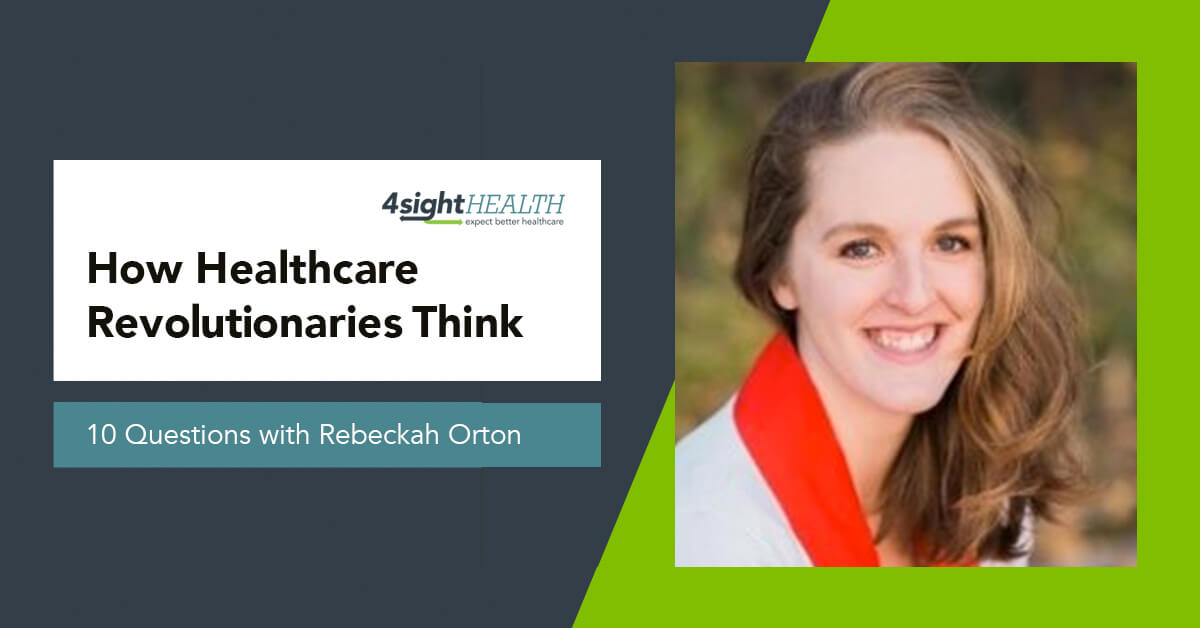April 18, 2023

How Healthcare Revolutionaries Think: 10 Questions with Rebeckah Orton
Welcome to the latest installment of 4sight Health’s series, How Healthcare Revolutionaries Think. Our interview series profiles healthcare instigators who believe that outcomes matter, customers count and value rules.
Better, faster, cheaper. What’s not to like? Attach those three adjectives to anything someone buys, and it’s an almost sure sale for the seller. Except when it comes to delivering healthy babies. That’s the uphill battle Rebeckah Orton faces as she tries to revolutionize low-risk labor and delivery services in the U.S.
Orton is a nurse, doula and owner of the Astoria Birth Center & Family Medicine in Oregon where, as a small business owner, she also wears the hats of executive director and office manager. The center’s nurse midwives deliver about 75 babies a year. That’s an easy push compared with Orton’s challenge, which is convincing commercial health insurers in Oregon to pay the same reimbursement rates for the same services to birthing centers like hers as they pay to hospitals. It’s not about profit. It’s about the financial sustainability of a care delivery model that offers more value to its patients — better outcomes, greater access and lower overall cost. Or, better, faster, cheaper.
I asked Orton about her women’s health origin story and what she learned about the healthcare system from working in more conventional care settings. I also asked her what she thinks of “Call the Midwife.” I just had to.
You can also listen to a podcast interview with Orton on what it’s like to be a Medicaid recipient herself and care for Medicaid recipients.
1. Rebeckah, give me your definition of a healthcare revolutionary.
Orton: In nursing school, they tell you to never be the first one or the last one to adopt a new practice, new evidence, a new therapy or any other type of industry-changing thing. No one wants to accept the liability of being the first. No one wants to accept the shame of being last. Healthcare revolutionaries are the first ones. They’re the ones who see the data and say, “This needs to change. This makes sense. Let’s do this.” They’re often the ones who are the weirdos, the ones that everyone gives a side-eye to and says, “Oh, what are they going to do next?” They’re like moral outcasts. I know that feels a bit strong, but they are the ones who don’t quite fit into the main medical herd.
2. The troublemakers make you feel uncomfortable, but they’re the ones who change things for the better. Do you have a favorite healthcare revolutionary past or present who fits that description?
Orton: I have three, if that’s OK. The first is Ruth Bader Ginsburg. She was weird. She was scrappy. She was the first to do a lot of things for women in general. She said — and this is a very rough paraphrase — women belong in all places where decisions are being made. That affects my practice. I serve women. I find it shocking and dismaying that so many decisions are being made about what we’re allowed to do and what will eventually happen to women. And women aren’t always present for those discussions.
Second is Neel Shah, M.D. He’s the chief medical officer of the Maven Clinic. He’s an obstetrician and a researcher, and one of the heroes in my life. I met him at a doula conference some 10 years ago, and he was presenting. He told this story about how it was years into his practice before someone told him what his C-section rate was. He didn’t know. Rather than reacting negatively, it gave him pause. He said something is wrong with our system if he’s not getting performance data. So, he starts digging into the data, starts talking about it and starts making waves. He used his scientific brain and thought, “It’s just not biologically feasible that so many babies need to be born via surgery.”
Third, and I hope this isn’t too on the nose, is Jesus. He was a healthcare revolutionary. He was the first to do what he did. Flying in the face of all the social norms at the time, he healed people on the Sabbath when you weren’t supposed to be doing so much as buttoning buttons. He spent his time with the poor, the downtrodden. In today’s world that would be the uninsured, the drug addicted and the social outcasts. He healed without discrimination. First to do it. First on the scene. And a weirdo. A healthcare weirdo.
3. I’m not going to argue with any of your choices, especially the last one. But it does make it tricky to ask this next question. Do you consider yourself a healthcare revolutionary? I mean, you’d be in pretty good company. Ruth Bader Ginsburg, Neel Shah and Jesus.
Orton: Time will tell if I was successful in accomplishing what I’ve set out to do. I don’t know the answer to that. I am surrounded by wonderful people who are tenaciously committed to this cause. Somewhere in there, one of us has got to be and maybe one of us is. But it takes time. Jesus isn’t here. Ruth Bader Ginsburg is dead. Neel Shah is very much alive. Maybe we don’t get to decide who the healthcare revolutionary is until we see what happened. But that’s what I’m shooting for.
4. How did you become a doula? Did you come from a family of doulas?
Orton: No family of doulas. But I did want to be a high-risk OB/GYN when I was doing my undergraduate in college. I had three things left my senior year before I applied to med school — a few more classes, my internship and studying for the MCATs. Then I just had this growing feeling that I was in the right area but on the wrong career path. There’s no other way to describe it other than it was an uneasy feeling. I researched my options, and I found out about nurse-midwifery. It was too late to change my major to nursing. But I did get an internship with nurse midwives affiliated with our local hospital, and I loved it.
As an undergraduate my degree in microbiology got me jobs in an oncology lab and then a parasitology lab. Then, after my second child was born, I looked at graduate schools to become a nurse midwife. The graduate programs wanted you to have doula experience, and I was like, “What’s a doula?” I took a short training program to become a doula and never went back. I thought, “Why doesn’t everybody have this kind of support in their labor?”
5. You found your calling as a doula. Where did the interest in birth come from? Most kids don’t want to be high-risk OB/GYNs when they grow up.
Orton: When I was little I dissected a slug with a pointy stick which, in retrospect, was a horrible thing to do. But I did. I was very curious at a young age. Maybe 5 or 6. When I dissected the slug, an egg came out and there was a little tiny baby slug inside. I was fascinated.
I’m also the youngest of eight. My husband also comes from a big family. He’s also the youngest. I think we’re up to 52 nieces and nephews at this point. We’re surrounded by pregnancies and babies. Being a doula just feels right.
6. Wow. Sounds like it wasn’t going to turn out any other way. But you did choose Astoria to open your birthing center, and you did choose to become a small business owner. Not all doulas do that. What’s the story behind Astoria and why you opened your own business?
Orton: Why Astoria is easy. I’m from here. I was living in Seattle at the time. The main issue I faced there was that the women who needed doulas the most had the least amount of access to them. I wasn’t sure how to solve that. Then I read an article about the Oregon Medicaid program being one of the first Medicaid programs in the country to pay doulas as a covered benefit. I thought, “That’s it! That’s where I’m going.”
The small business part is more complicated. I’ll give you the short version. We bought the building with the thought of opening a birthing center in 10 or 15 years. Then COVID hit in early 2020 and in record time we set ourselves up as a remote labor and delivery unit option with the purpose of serving our local hospital. The hospital did a great job of quarantining off its L&D unit, but a lot of people with low-risk births didn’t want to deliver inside the hospital because they thought it wasn’t safe, and they would contract the virus. We were set up to be a satellite location to deliver babies.
Well, the surge in COVID patients never happened at the hospital, but the demand for out-of-hospital births went through the roof. Things just fell into place. There was this unmet need for a service in the market that was going unanswered. The pandemic was the trigger. What do they say in the crime shows? We had the method, the means and the opportunity.
7. You had more traditional positions working in labs. What did that experience teach you about the healthcare financing system in the U.S.? How did that shape the way you think about healthcare?
Orton: They were great introductions to how things work in healthcare, and they gave me an awful lot to think about. For example, we would have enough overfill to give a 21st dose of a chemotherapy drug to a patient after using two multidose vials of 10 doses each, which would have amounted to 20 doses. We never paid for that 21st dose, but we billed for it. We billed for hundreds of thousands of dollars for drugs we never paid for. It’s one way healthcare providers try to recoup their costs.
Then there’s how drug companies price their drugs. The price isn’t based on how much it costs to make the drug or the drug’s effectiveness. It’s based on three things: how much the company needs to recoup its R&D investment, how much the company needs to make a profit and how much the company needs to make after the drug goes off patent and becomes generic. It’s all market dynamics.
I was young and taking it all in. I put it in my pocket. I didn’t know what to do with it right then, but the lessons I learned really became a significant puzzle piece for me after I moved on. I have no regrets about doing them. It came together when I pursued my passion for women’s health and pregnancy care. All of those puzzle pieces started coming together to say, “Oh, we have a big problem!” I started to see why women’s health and pregnancy care were the way they were and why that needed to change.
8. How did what you learned explain the status quo in maternity care?
Orton: It explains why C-section rates are so much higher in some states like Oregon. It explains why women with low-risk pregnancies deliver their babies at the hospital, usually with obstetricians, instead of by nurse-midwives and doulas at birth centers. Oregon has one of the highest price differences of any state between a vaginal birth and a cesarean birth. It’s like a $10,000 difference. That creates a financial incentive to do a cesarean. And hospitals are reimbursed way more than birth centers for low-risk vaginal births. That creates a financial incentive to send patients to hospitals instead of birthing centers. It’s just business. And it’s crazy because we spend more on maternity care than any other country and we have the worst maternal outcomes of any other country.
9. Where are the health insurance companies in all of this?
Orton: I ask myself the same question. This is a win for clients. This is a win for the community. This is a win for insurance companies. Who is this not a win for? The answer, unfortunately, is the status quo. A lot of it is cultural. Historically, the primary birth attendants in the U.S. were midwives. OBs didn’t even exist yet. OBs came in, learned from the midwives and recast midwives in a negative light. “They’re dirty. They’re uneducated. They’re unsafe.” You name it. If you as a patient have any status at all, you would use an obstetrician and not a midwife. Midwives today also make the mistake of saying they’re cheaper. That, too, carries a negative connotation. We’ve got to stop saying it. Better to say, “We’re more cost-effective.” Those ideas became prevalent. People run insurance companies — people who are subject to the culture in which they live and the systems in which they work.
We did an economic analysis that showed that health insurers in Oregon could save $98 million a year if they paid birthing centers the same amount that they pay hospitals for low-risk, uncomplicated vaginal births. Apples to apples. No extras for epidurals. No extras for C-sections. No extras for all the things that hospitals tack on to their bills. We’re presenting that analysis at a meeting on April 19 with every insurance company that does business in Oregon. The state insurance commissioner set up the meeting. I’ll let you know how it turns out.
10. Last question, Rebeckah. Do people ask you if you watch “Call the Midwife”?
Orton: Yes, I get asked that a lot. And yes, I did watch the first two or three seasons that were based on the memoirs by Jennifer Worth. I read the book. I watched the series. After Worth’s actual memoirs ran out, the show went off-script and they just made up their own stories. They’re not based on her stories. You can tell. I didn’t care for the show too much after that and stopped watching.
Burda’s Final Bit
My wife was a labor and delivery nurse and manager at an academic medical center before she began teaching obstetrical nursing at one of our local universities. When she worked in labor and delivery, I met a lot of her nurse coworkers, most of whom worked in the unit for years. It was clear that helping women deliver their babies was a calling, not a job. They were experts. They were experienced. They were dedicated. They were vocal patient advocates. And they didn’t take crap from hospital administrators, attending physicians or medical residents. I get that same vibe from Rebeckah Orton. There’s nothing she wouldn’t do for one of her pregnant clients. So much so that she’s expanding her calling to change a system that embraces a status quo that puts patients last, not first, as incumbent healthcare organizations claim.
If I were a health insurance company executive, I wouldn’t get in her way.
Read More Interviews with Healthcare Revolutionaries
- February 2023: Dan Trigub
- January 2023: Melina Davis
- December 2022: Bruce Brandes
- November 2022: Lena Chaihorsky
- July 2022: David Nash, M.D.
- June 2022: Esther Dyson
- April 2022: Meghan Conroy
- March 2022: Adrianne Nickerson
- February 2022: David Snow
- January 2022: Kristen Valdes
- October 2021: Glen Tullman
- September 2021: David Greenberg and Dave Jacobs
- August 2021: Jeff Jones
- July 2021: Scott Powder
- June 2021: Robert Pearl, M.D.
- May 2021: Kurt Waltenbaugh
- April 2021: Jon Pearce
- March 2021: Thompson Aderinkomi
- February 2021: Gaurov Dayal, M.D.
Rebeckah Orton is a registered nurse and executive director at Astoria Birth Center & Family Medicine.
Astoria Birth Center & Family Medicine, the Oregon area’s first freestanding birth and primary care center, offers full support for women and families. Astoria is in-network with Oregon Heath Plan, Molina/Apple Health, Providence, Regence (provider group), Moda, TriCare, and are in-process with Regence (facility), Aetna, Cigna, UHC, UMR and PacificSource.





